In 2025, the indoor space heater market is valued at USD 13.3 billion and is projected to reach USD 23.2 billion by 2035, growing at a CAGR of 5.7%. The absolute dollar opportunity over this period is USD 9.9 billion, representing the additional revenue potential from 2025 to 2035. This growth reflects increasing demand for efficient and reliable indoor heating solutions across residential and commercial spaces.
Companies can capitalize on this opportunity by expanding product portfolios, enhancing distribution networks, and targeting regions with high heating requirements. The incremental growth provides a clear financial incentive for strategic investment and business planning. From a business perspective, the USD 9.9 billion absolute dollar opportunity highlights significant revenue potential for both new entrants and established players. With the market gradually increasing from USD 13.3 billion in 2025 to USD 23.2 billion in 2035 at a CAGR of 5.7%, firms can plan phased investments and scale operations strategically.
By focusing on key regions, optimizing supply chains, and improving product accessibility, stakeholders can capture incremental revenue. This predictable growth trajectory allows companies to strengthen market positioning, expand customer base, and achieve sustained profitability over the ten-year period.
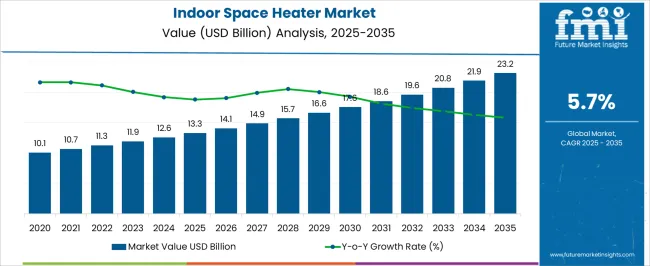
| Metric | Value |
|---|---|
| Indoor Space Heater Market Estimated Value in (2025 E) | USD 13.3 billion |
| Indoor Space Heater Market Forecast Value in (2035 F) | USD 23.2 billion |
| Forecast CAGR (2025 to 2035) | 5.7% |
A breakpoint analysis for the indoor space heater market highlights key thresholds where growth accelerates or strategic adjustments become necessary. With the market valued at USD 13.3 billion in 2025 and projected to reach USD 23.2 billion by 2035 at a CAGR of 5.7%, early breakpoints occur around USD 15.7–16.6 billion. These levels represent the initial phase of notable market expansion, reflecting rising demand for indoor heating solutions in residential and commercial sectors.
Recognizing these breakpoints allows companies to allocate resources efficiently, expand production capacity, and optimize distribution channels to capture incremental revenue during periods of accelerated growth. Later-stage breakpoints appear between USD 19.6–21.9 billion as the market approaches maturity and competition intensifies. Surpassing these thresholds may require firms to refine pricing strategies, enhance operational efficiency, and strengthen customer engagement to sustain growth momentum. Monitoring these breakpoints enables companies to anticipate shifts in demand and adjust production, marketing, and sales strategies accordingly.
By aligning strategic actions with these critical thresholds, stakeholders can maximize revenue potential, reinforce market positioning, and navigate the steady growth trajectory from 2025 to 2035 with informed precision.
The market is experiencing sustained growth, supported by rising demand for energy-efficient and compact heating solutions across residential and commercial environments. Increasing consumer preference for portable and quick-heating devices has encouraged innovation in design and performance, leading to a broader adoption in both cold-climate and seasonal heating markets. Advances in heating technology, integration of safety features, and availability of variable power modes have further expanded consumer reach.
Rising awareness regarding indoor air quality and safe heat dispersion methods is influencing product development strategies. The market outlook is shaped by a shift toward energy-efficient electric heating systems and compact designs that fit modern living spaces.
As energy costs and sustainability concerns continue to grow, manufacturers are focusing on high-efficiency models with advanced temperature control. This alignment with consumer needs and regulatory efficiency standards is expected to support continued market expansion in the coming years.
The indoor space heater market is segmented by product type, power source, end user, price, technology, distribution channel, and geographic regions. By product type, indoor space heater market is divided into Ceramic heater, Convection heater, Radiant & infrared heater, Fan heater, Oil filled heater, and Others. In terms of power source, indoor space heater market is classified into Electric and Gas.
Based on end user, indoor space heater market is segmented into Residential and Commercial. By price, indoor space heater market is segmented into Medium, Low, and High. By technology, indoor space heater market is segmented into Portable and Surface-mounted. By distribution channel, indoor space heater market is segmented into Online and Offline. Regionally, the indoor space heater industry is classified into North America, Latin America, Western Europe, Eastern Europe, Balkan & Baltic Countries, Russia & Belarus, Central Asia, East Asia, South Asia & Pacific, and the Middle East & Africa.
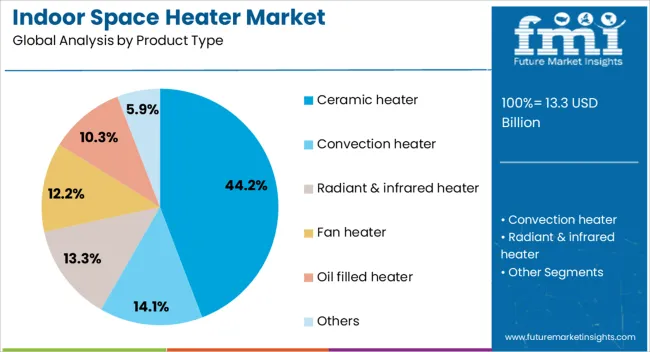
The ceramic heater segment is projected to hold 44.2% of the Indoor Space Heater market revenue in 2025, making it the leading product type. This dominance is being attributed to its ability to deliver quick and consistent heat output while maintaining energy efficiency. Ceramic heaters operate using advanced ceramic plates that retain and radiate heat effectively, resulting in a comfortable and stable indoor environment.
Their compact size, lightweight structure, and enhanced safety features have made them suitable for a wide range of applications. The segment has also benefited from improved durability and low maintenance requirements, which appeal to cost-conscious consumers.
Additionally, the ability to integrate programmable thermostats and variable heat settings has increased their appeal in markets where precise temperature control is valued. The combination of rapid heating capability, energy efficiency, and user-friendly design has positioned ceramic heaters as a preferred choice for both short-term and continuous indoor heating needs.
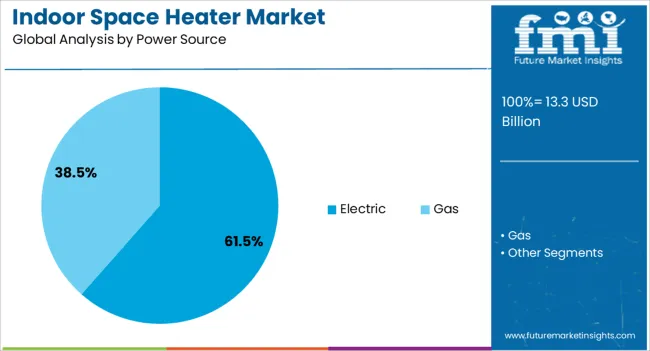
The electric segment is anticipated to account for 61.5% of the Indoor Space Heater market revenue in 2025, representing the largest share by power source. Growth in this segment is being driven by the widespread availability of electric infrastructure, ease of installation, and low upfront costs compared to alternative heating systems. Electric space heaters require no fuel storage or ventilation, making them highly adaptable for a variety of indoor settings.
The increasing integration of energy-saving modes, adjustable thermostats, and programmable timers has enhanced their operational efficiency and consumer appeal. Additionally, advancements in electric heating elements have improved safety and reduced energy wastage, aligning with both consumer expectations and energy efficiency regulations.
The segment has also gained traction due to the ease of portability and versatility in design, enabling their use across multiple rooms and applications without complex setup. This combination of convenience, efficiency, and adaptability continues to reinforce the leading position of electric space heaters in the market.
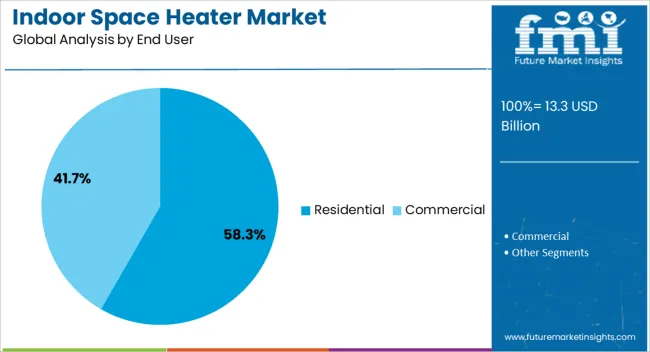
The residential segment is expected to capture 58.3% of the Indoor Space Heater market revenue in 2025, making it the dominant end-user category. This leading position is being supported by the growing need for supplemental heating solutions in households, particularly in regions with fluctuating winter temperatures. Consumers are increasingly opting for compact, portable heaters to supplement central heating systems or to provide targeted warmth in specific living spaces.
The affordability of modern indoor heaters, combined with advancements in safety mechanisms such as tip-over protection and overheat sensors, has further encouraged adoption in residential settings. Additionally, lifestyle shifts toward remote work have increased the need for efficient room-specific heating, supporting demand in home offices and personal spaces.
The segment’s growth is also reinforced by increased product variety, catering to diverse household sizes and aesthetic preferences.
The indoor space heater market is growing due to rising demand for residential heating, energy-efficient solutions, and seasonal climate variations. North America and Europe lead with premium electric, ceramic, and oil-filled heaters offering safety features and programmable controls. Asia-Pacific shows rapid growth driven by urbanization, cold-climate regions, and increasing disposable income. Manufacturers differentiate through heating efficiency, design, safety certifications, and smart connectivity. Regional variations in climate, electricity costs, and consumer preferences influence product adoption, pricing strategies, and competitive positioning globally.
Indoor space heaters use various energy sources electric, gas, kerosene, and oil-filled designs affecting efficiency, safety, and operational cost. North America and Europe emphasize electric and ceramic heaters for residential and office use due to safety and regulatory standards. Asia-Pacific markets adopt a mix of electric, gas, and kerosene heaters, balancing cost and availability. Differences in heater type and energy source influence operational efficiency, convenience, and consumer preference. Leading manufacturers offer high-efficiency, safety-certified heaters, while regional producers target affordable, functional options. These contrasts shape regional adoption, product positioning, and competitiveness in diverse residential and commercial segments.
Consumer adoption heavily relies on safety certifications, overheat protection, tip-over switches, and child-lock features. Europe and North America require compliance with strict electrical and fire safety standards, favoring certified products. Asia-Pacific markets show increasing awareness of safety features, though cost-sensitive buyers often prioritize affordability. Differences in safety compliance and features affect consumer trust, repeat purchases, and liability risk. Manufacturers offering certified, feature-rich heaters gain competitive advantage, while regional producers focus on accessible, basic safety measures. Safety contrasts influence market adoption, brand differentiation, and penetration across high-end and mass-market segments.
Heater design, size, portability, and smart connectivity impact adoption. North America and Europe favor compact, stylish units with Wi-Fi control, programmable timers, and energy-saving modes for modern homes. Asia-Pacific markets prefer practical, portable, and cost-effective heaters for small residential and office spaces. Differences in design and smart features affect convenience, energy efficiency, and repeat purchases. Suppliers providing aesthetically appealing, technologically advanced units capture premium consumers, while regional manufacturers target functional, budget-conscious buyers. These contrasts shape regional adoption patterns, product differentiation, and market competitiveness in residential heating.
Indoor space heaters are sold through e-commerce, home appliance stores, supermarkets, and specialty retailers. Europe and North America leverage online platforms and professional retail networks to provide variety and installation guidance. Asia-Pacific depends on retail chains, local distributors, and online marketplaces for accessibility and affordability. Differences in distribution and seasonality influence availability, pricing, and adoption speed. Leading suppliers use multi-channel strategies with after-sales support and promotions, while regional producers focus on local accessibility and bulk distribution. Distribution contrasts determine regional penetration, customer satisfaction, and long-term growth across seasonal and year-round applications.
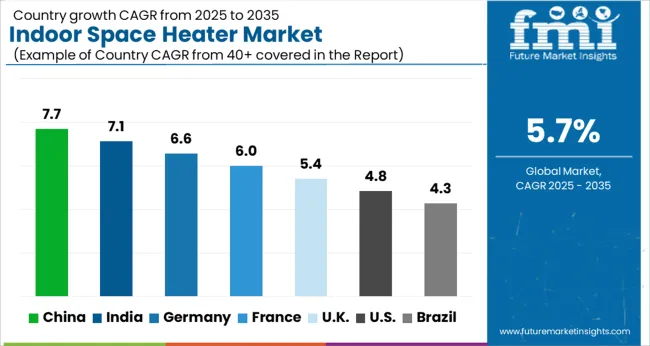
| Country | CAGR |
|---|---|
| China | 7.7% |
| India | 7.1% |
| Germany | 6.6% |
| France | 6.0% |
| UK | 5.4% |
| USA | 4.8% |
| Brazil | 4.3% |
The global indoor space heater market was projected to grow at a 5.7% CAGR through 2035, driven by demand in residential, commercial, and industrial heating applications. Among BRICS nations, China recorded 7.7% growth as large-scale manufacturing and assembly facilities were commissioned and compliance with product quality and safety standards was enforced, while India at 7.1% growth saw expansion of production units to meet rising regional demand. In the OECD region, Germany at 6.6% maintained substantial output under strict industrial and electrical safety regulations, while the United Kingdom at 5.4% relied on moderate-scale operations for residential and commercial heating solutions. The USA, expanding at 4.8%, remained a mature market with steady demand across residential, commercial, and industrial segments, supported by adherence to federal and state-level safety and quality standards. This report includes insights on 40+ countries; the top five markets are shown here for reference.
Indoor space heater market in China is growing at a CAGR of 7.7%. Between 2020 and 2024, growth was driven by rising urbanization, increasing residential construction, and demand for energy-efficient heating solutions. Manufacturers focused on high-performance, durable, and low-energy consumption heaters suitable for urban apartments and commercial spaces. In the forecast period 2025 to 2035, growth is expected to accelerate with adoption of smart, connected, and eco-friendly heating devices integrated with IoT and energy management systems. Expansion of residential and commercial building projects, government incentives for energy-efficient appliances, and rising consumer awareness of sustainable heating solutions will further support market growth. China remains a leading market due to rapid urban development, a growing middle-class population, and a focus on energy-efficient appliances.
Indoor space heater market in India is growing at a CAGR of 7.1%. The historical period from 2020 to 2024 saw growth supported by rising residential and commercial construction, increasing disposable income, and demand for energy-efficient heating solutions. Manufacturers focused on cost-effective, durable, and low-energy heaters suitable for diverse climates and living spaces. In the forecast period 2025 to 2035, market growth is expected to continue with the adoption of smart, IoT-enabled, and eco-friendly heaters integrated with energy management systems. Expansion of residential infrastructure, urban electrification, and rising awareness of energy-efficient appliances will further boost adoption. India is projected to maintain strong growth due to growing urban population, rising middle-class income, and increasing focus on sustainable heating technologies.
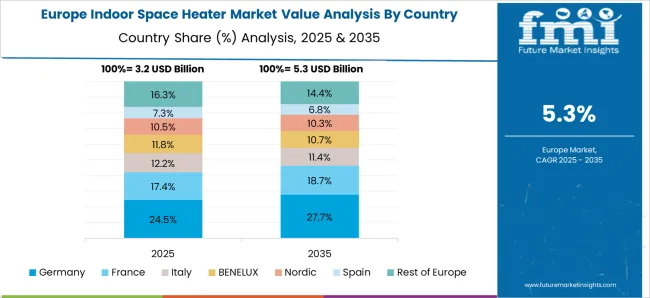
Indoor space heater market in Germany is growing at a CAGR of 6.6%. Between 2020 and 2024, growth was supported by rising demand for energy-efficient appliances, strict environmental regulations, and modern residential and commercial construction. Manufacturers focused on high-performance, durable, and energy-saving heaters suitable for urban and suburban households. In the forecast period 2025 to 2035, growth is expected to continue steadily with adoption of smart, connected, and eco-friendly heating devices integrated with renewable energy systems. Sustainability initiatives, government incentives for energy efficiency, and technological innovation will further drive adoption. Germany remains a key European market due to strong environmental policies, high disposable income, and preference for energy-efficient heating solutions.
Indoor space heater market in the United Kingdom is growing at a CAGR of 5.4%. During 2020 to 2024, adoption was driven by rising residential and commercial heating requirements, energy-efficient appliance programs, and growing urbanization. Manufacturers focused on durable, low-energy, and safe heaters suitable for homes and offices. In the forecast period 2025 to 2035, market growth is expected to continue moderately with adoption of smart, IoT-integrated, and eco-friendly heating solutions. Expansion of residential infrastructure, energy efficiency incentives, and awareness campaigns will further support market development. The United Kingdom market demonstrates stable growth with focus on sustainability, safety, and efficient heating technologies.
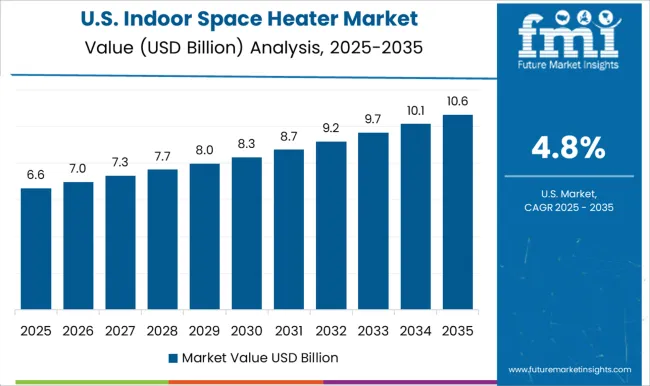
Indoor space heater market in the United States is growing at a CAGR of 4.8%. The historical period from 2020 to 2024 saw growth fueled by residential and commercial heating demand, energy efficiency programs, and the adoption of modern appliances. Manufacturers focused on high-performance, durable, and energy-saving heaters suitable for diverse climates and building types. In the forecast period 2025 to 2035, growth is expected to continue steadily with adoption of smart, connected, and eco-friendly heaters integrated with IoT-enabled energy management systems. Expansion of residential and commercial infrastructure, sustainability initiatives, and consumer awareness of energy-efficient heating solutions will further drive market adoption. The United States market demonstrates consistent growth with emphasis on durability, efficiency, and smart technologies.
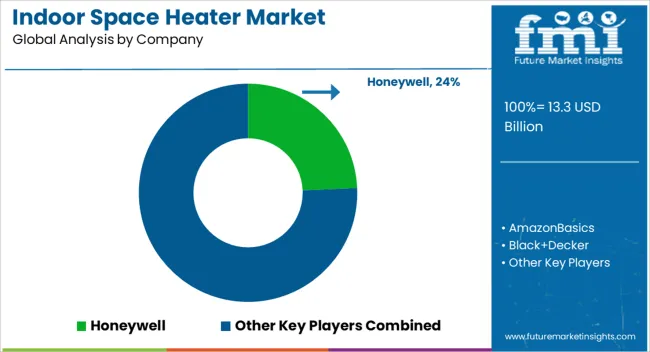
The indoor space heater market is supplied by Honeywell, AmazonBasics, Black+Decker, Cadet Manufacturing, Comfort Zone, De’Longhi, Dr. Infrared Heater, Dyson, EdenPURE, Lasko Products, Optimus, Pelonis, Proctor Silex, Stiebel Eltron, and Vornado. Competition is influenced by heating technology, energy efficiency, safety certifications, and design versatility. Honeywell and Dyson brochures emphasize ceramic and fan-forced heaters with rapid heat-up, thermostat control, and tip-over protection. De’Longhi and Dr. Infrared Heater highlight infrared and dual heating systems for uniform warmth and low energy consumption. Observed trends include remote control operation, compact form factors, and integration with smart home platforms.
Market strategies focus on segment targeting, technology differentiation, and channel expansion. Lasko and Comfort Zone target mass-market consumers through retail and e-commerce with affordable, portable units. EdenPURE and Stiebel Eltron focus on premium segments, highlighting advanced infrared panels, silent operation, and high-quality finishes. Cadet Manufacturing and Pelonis leverage wall-mounted and space-saving designs for residential and commercial installations.
| Item | Value |
|---|---|
| Quantitative Units | USD 13.3 Billion |
| Product Type | Ceramic heater, Convection heater, Radiant & infrared heater, Fan heater, Oil filled heater, and Others |
| Power Source | Electric and Gas |
| End User | Residential and Commercial |
| Price | Medium, Low, and High |
| Technology | Portable and Surface-mounted |
| Distribution Channel | Online and Offline |
| Regions Covered | North America, Europe, Asia-Pacific, Latin America, Middle East & Africa |
| Country Covered | United States, Canada, Germany, France, United Kingdom, China, Japan, India, Brazil, South Africa |
| Key Companies Profiled | Honeywell, AmazonBasics, Black+Decker, Cadet Manufacturing, Comfort Zone, De'Longhi, Dr. Infrared Heater, Dyson, EdenPURE, Lasko Products, Optimus, Pelonis, Proctor Silex, Stiebel Eltron, and Vornado |
| Additional Attributes | Dollar sales vary by heater type, including convection, radiant, fan-forced, and oil-filled heaters; by fuel type, spanning electric, gas, and kerosene; by application, such as residential, commercial, and industrial spaces; by region, led by North America, Europe, and Asia-Pacific. Growth is driven by rising cold-climate demand, energy-efficient heating solutions, and increasing home comfort awareness. |
The global indoor space heater market is estimated to be valued at USD 13.3 billion in 2025.
The market size for the indoor space heater market is projected to reach USD 23.2 billion by 2035.
The indoor space heater market is expected to grow at a 5.7% CAGR between 2025 and 2035.
The key product types in indoor space heater market are ceramic heater, convection heater, radiant & infrared heater, fan heater, oil filled heater and others.
In terms of power source, electric segment to command 61.5% share in the indoor space heater market in 2025.






Full Research Suite comprises of:
Market outlook & trends analysis
Interviews & case studies
Strategic recommendations
Vendor profiles & capabilities analysis
5-year forecasts
8 regions and 60+ country-level data splits
Market segment data splits
12 months of continuous data updates
DELIVERED AS:
PDF EXCEL ONLINE
Indoor Rotary High Voltage Disconnect Switch Market Size and Share Forecast Outlook 2025 to 2035
Indoor Cable Assemblies Market Size and Share Forecast Outlook 2025 to 2035
Indoor Residential Switchgear Market Size and Share Forecast Outlook 2025 to 2035
Indoor Air Quality Monitor Market Size and Share Forecast Outlook 2025 to 2035
Indoor Location Market Size and Share Forecast Outlook 2025 to 2035
Indoor Farming Market Analysis - Size, Share, and Forecast 2025 to 2035
Indoor Smokehouses & Pig Roasters Market – Smoked Meat Processing 2025 to 2035
A Detailed Global Analysis of Brand Share for the Indoor Farming Market
Smart Indoor Gardening System Market Size and Share Forecast Outlook 2025 to 2035
Family/Indoor Entertainment Centres Market Report – Forecast 2017-2027
Cat Condos & Indoor Houses Market Insights - Size & Trends 2025 to 2035
Space-based C4ISR Market Size and Share Forecast Outlook 2025 to 2035
Space Lander and Rover Market Size and Share Forecast Outlook 2025 to 2035
Space-Based Solar Power Market Size and Share Forecast Outlook 2025 to 2035
Space Frame Market Size and Share Forecast Outlook 2025 to 2035
Space Situational Awareness Market Size and Share Forecast Outlook 2025 to 2035
Space Robotics Market Size and Share Forecast Outlook 2025 to 2035
Space On Board Computing Platform Market Size and Share Forecast Outlook 2025 to 2035
Space Militarization Market Size and Share Forecast Outlook 2025 to 2035
Space Economy Market Size and Share Forecast Outlook 2025 to 2035

Thank you!
You will receive an email from our Business Development Manager. Please be sure to check your SPAM/JUNK folder too.
Chat With
MaRIA